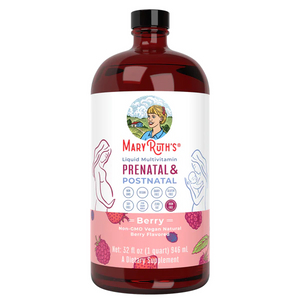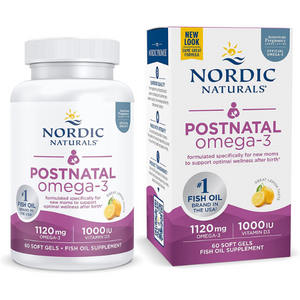5 Best Postnatal Vitamins for Breastfeeding Moms in 2024
All articles are produced independently. When you click our links for purchasing products, we earn an affiliate commission. Learn more about how we earn revenue by reading our advertise disclaimer.
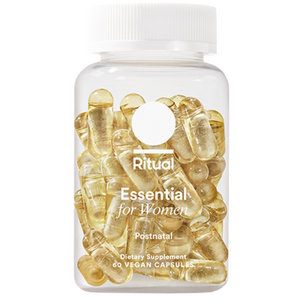
Ritual Essential for Women Postnatal Multivitamin
- Delayed-release capsule design
- Traceable ingredients, third-party tested
- Ingredients that support lactation
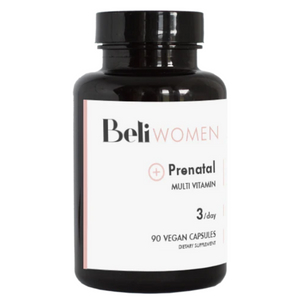
Beli Women Prenatal Multivitamin
- Can be used as a postnatal vitamin
- Allergen and dairy free
- Gentle on the stomach
15% Off Coupon: HEALTHCANAL
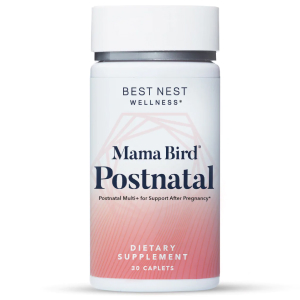
Best Nest Wellness Mama Bird Postnatal Multi+
- Easy to swallow capsule
- Non-GMO, no artificial colors or flavors, free of allergens
- Third-party tested
- Added probiotic
The phase of motherhood is filled with both joy and plenty of sacrifice from your body. Breastfeeding is another important phase, a phase that can be exciting and worrisome at the same time.
You wonder, can I produce what my baby needs? Am I eating enough to be nourished? What can I do to improve my chances of giving my baby everything they need through breastfeeding?
If you ask yourself these questions, you are not alone. Many moms, including health professionals, feel unsure if what they eat is enough or if they are providing their babies with the necessary nutrients.
Guess what? You can definitely provide your infant with the nutrients she needs through breastfeeding[1], as the body is made to do this. You can consider using postnatal supplements to help you obtain all the nutrients your body needs to make breast milk. Read on for the five best postnatal vitamins.
5 Best Postnatal Vitamins For Breastfeeding Moms In (April. 2024)
- Ritual Essential for Women Postnatal Multivitamin – Editor’s Choice
- Beli Women Prenatal Multivitamin – Best for a variety of use
- Best Nest Wellness Mama Bird Postnatal Multi+ – Best for a variety of ingredients
- Mary Ruth’s Prenatal & Postnatal Liquid Multivitamin – Best Liquid form
- Nordic Naturals Postnatal Omega-3 – Best High-End
Why Should You Take Postnatal Vitamins?
Postnatal vitamins provide additional support for breastfeeding mothers directly and their breastfed babies indirectly. Directly, the mother obtains the essential nutrients and uses those nutrients to make breast milk. Indirectly, those nutrients are used to make breast milk to provide the baby with the milk supply for their own growth and brain development.
Prenatal vs. Postnatal Vitamins: What’s The Difference?
The moment you realize you are expecting, the first thing your doctor will say is to start taking a prenatal daily vitamin with folic acid and follow a healthy diet. This is to prevent neural tube defects in the fetus and help with the nervous system and brain development.
An essential nutrient is often obtained from a variety of foods, but during pregnancy, these nutrients can be quickly depleted. That is because a pregnancy uses up a lot of nutrients[2], including any nutrient stores.
The reality is that following a healthy diet is the best way to get the key nutrients your body needs during pregnancy. Although, sometimes, a pregnancy asks so much of your body that your nutritional needs, through your diet[3] alone, may not be enough.
A pregnant woman needs important nutrients, including folic acid, iron, calcium, vitamin D, vitamin C, vitamin E, and vitamin B complex[4]. These nutrients are also important if you plan to get pregnant, so you should even start taking prenatal vitamins before pregnancy.
Prenatal vitamins are not just for when you are pregnant but can be taken in preparation for becoming pregnant. It’s even advised to start taking a prenatal vitamin if you are of childbearing years.
But postpartum mothers need other types of vitamins to help support milk production, help with baby blues, and recover from hair loss. These include the vitamins B complex–B1, B2, B6, and B12; vitamin D, choline, iodine, and docosahexaenoic acid (DHA)[5].
Taking prenatal and postnatal vitamins can help you get an overall consistent amount of key vitamins that can meet nutritional needs during pregnancy and after the transition between the two.
How Co Choose The Best Postnatal Vitamin
When choosing the best postnatal supplement for you, it’s not as simple as choosing the first one you find or the most expensive one. Choose the postnatal supplement that fits your specific situation and needs.
Your needs can be increased for essential nutrients due to complications during birth, not taking enough prenatal vitamins, getting baby blues, improving milk supply, increasing iron intake, or just seeking health balance.
Price
The price ranges from $35 – $50; the reason for the price differences can be related to the number of ingredients or quality of them. If there are concerns about budget constraints, there are budget-friendly postnatal vitamin supplements as low as $35 and possible additional discounts.
One particular manufacturer, Mary Ruth’s, can provide financial support. Most manufacturers will have some type of discount through newsletter sign-ups or subscriptions.
Third-Party Tested
Postnatal vitamins are not regulated by the Food and Drug Administration (FDA)[6]. Therefore some manufacturing companies do third-party testing on their own. This assures them that what they make is accurate and of good quality and provides their customers with a sense of trust.
The most commonly used third-party companies are USP (United States Pharmacopeia), NSF International (National Sanitation Foundation), and ConsumerLabs.com. When looking into a company with third-party testing, look for the reports. Manufacturers that truly use third-party testing will be willing to share the results on their websites.
Type Of Supplement
You can get the supplement as postnatal gummy vitamins, capsules, soft gel, or liquid form. This is important because some capsules may be too big, especially if swallowing pills is not your thing.
But you may get nauseated by the gummy vitamins or not like the aftertaste of liquid form. So it’s important to know your preference.
5 Best Postnatal Vitamins for Breastfeeding Moms In 2024
Ritual Essential for Women Postnatal Multivitamin
Ritual’s postnatal vitamin includes ingredients that support breastfeeding women, are traceable, and are third-party tested.
- Delayed-release capsule design
- Traceable ingredients, third-party tested
- Ingredients that support lactation
- Exceeds recommended percent daily value of vitamin D (fat-soluble)
Ritual Essential for Women Postnatal Multivitamin’s best feature is the delayed-release capsule design. You can take this capsule with or without food as it dissolves in less sensitive intestinal tract areas.
Also, this feature can be great for any person with a sensitive stomach. It’s free of major food allergens, gluten-free, and vegan-friendly.
The nutrients in this multivitamin offer help with normal immune function through vitamins A, C, D3, and zinc. You will also get help with brain function through choline, vitamin B12, and omega-3 docosahexaenoic (DHA)[7] extracted from microalgae.
A breastfeeding woman also has increased nutrient needs; therefore, the added nutrients, including omega-3 with DHA, iodine, biotin, and choline, are helpful.
The recommended dosage is two capsules daily with or without food; it can be taken six months postpartum or as long as breastfeeding. You get a 30-day money-back guarantee, in full, on your first order.
Beli Women Prenatal Multivitamin

Beli Women prenatal vitamins can be used before, during, and after pregnancy and are gentle on the stomach.
- Can be used as a postnatal vitamin
- Allergen, and dairy free
- Gentle on the stomach
- Exceeds recommended percent Daily Value (DV) of vitamin D (fat-soluble)
Beli is a prenatal vitamin, but its nutrient combination makes it good to be used as a postnatal vitamin as well. It is free from common food allergens, and dairy is gluten-free and has ingredients that help you maintain energy during and after pregnancy.
Its ingredients include iodine[8] (from kelp), for pregnant women at risk of deficiency. You will also find vitamin D, E, K, C, B vitamins, molybdenum (as TRAACS), and other minerals. TRAACS is a trademarked mineral that is easier to absorb and helps it be gentle on the stomach.
To buy this supplement, you need to subscribe and can find additional savings on the website. The recommended dose is three times daily when thinking about conceiving, trying to conceive, through your pregnancy, after having your baby, and if you are lactating.
You get a 30-day money-back guarantee on your first purchase; no need to return the supplements.
Best Nest Wellness Mama Bird Postnatal Multi+
A postnatal vitamin with a variety of easily absorbable nutrients added to whole foods and probiotics. It can be taken once a day in an easy-to-swallow capsule.
- Easy to swallow capsule
- Non-GMO, no artificial colors or flavors, free of allergens
- Third-party tested
- Added probiotic
- May cause nausea
Best Nest Wellness Mama Bird Postnatal Multi+ has an easy-to-swallow capsule and is gentle on your stomach, and you only need to take it once a day.
The nutrients help with immunity and brain development for babies during breastfeeding. It also comes with added probiotics for a healthy digestive system and digestive enzymes that are gentle on the stomach and help with absorption.
The ingredients are important nutrients like vitamins and minerals for postpartum recovery. You will find vitamin A, vitamin D, vitamin E, vitamin K, B vitamins, folate, biotin, choline, iodine, and other minerals. There is also an organic blend of ginger root[9], broccoli, pomegranate, spinach leaves, and kale leaves.
The recommended dosage is one capsule daily; you can make a one-time purchase or subscribe and save 10%. You get a 30-day money-back guarantee for any supplement purchased through the Best Nest Wellness website.
Mary Ruth’s Prenatal & Postnatal Liquid Multivitamin
A liquid form of prenatal and postnatal vitamins, made of fruit blends and completely sourced with plant-based ingredients.
- Liquid form
- Non-GMO, free of allergens
- Whole fruit blend
- Not a low-calorie food
- May have an aftertaste
- Contains a proprietary blend of minerals
Mary Ruth’s Prenatal and Postnatal Liquid Multivitamin is the best postnatal vitamin in liquid form. Postnatal vitamins are usually in capsule form, but you may prefer the liquid form in case you may want to drink your supplement. Some clients have reported an aftertaste, but it depends on your own taste buds.
This pre- and postnatal vitamin supplement include vitamins A, B12, C, D, E, and B vitamins, choline, calcium, folate, biotin, and other minerals. It also includes a proprietary blend of trace minerals (ConceTrace®), ginger root[9], and an organic fruit blend of apple, cranberry, blueberry, and elderberry.
The recommended dosage is two tablespoons daily (1 fl. oz), best taken in the morning and on its own or added to a smoothie or drink. The unopened bottle can last up to two years; once opened and refrigerated, it can last six months. You get a 30-day guarantee for a product exchange or store credit.
Nordic Naturals Postnatal Omega-3
A soft gel that provides ingredients for positive mood, healthy immunity, and body composition. Ingredients are naturally found in fish.
- In soft gel form
- Non-GMO, third-party tested, Friends of the Sea Certified (FOS)
- No artificial colors or flavors
- Not vegan-friendly
A different type of postnatal vitamin; unlike many postnatal vitamins, this one focuses on omega-3 fatty acids from DHA (docosahexaenoic acid) and EPA (eicosapentaenoic acid) and vitamin D.
The source of omega-3 fatty acids is fish, as a fish oil supplement. All products from Nordic Naturals Postnatal Omega-3 are non-GMO, third-party tested, and are Friends of the Sea Certified (FOS)[10], a leading certification for products and services which respect sea life and its environment.
Omega-3 fatty acids are very important in helping with mood[7] and the development of a fetus[11]. Also, vitamin D is sourced from olive oil, a good way to obtain this very important nutrient postpartum.
The recommended dosage is two soft gels daily with food or as directed by a health professional. You get a 30-day money-back guarantee if the product is unopened.
How To Take Postnatal Vitamins Properly?
When Should You Take Postnatal Vitamins?
Postnatal vitamins are all unique in ingredients; therefore, the time of day, amount, and if it’s to be taken with or without food should be as instructed by the manufacturing company.
Most of the time, you will need to take the supplement in the morning and with food, but this varies, and it’s best to follow the advice of the supplement label.
How Long Should You Take Postnatal Vitamins?
The postpartum period is from the mother giving birth up until six months. You can take postnatal vitamins during that postnatal period. Although, if you have been breastfeeding beyond six months, you can take post-natal vitamins longer.
What Nutrients Are Important For Breastfeeding Moms?
When you start taking postnatal vitamins, choosing a daily supplement should be based on having a combination of vitamins and minerals. Many supplements contain vitamin B complex, B1, B2, B6, and B12, vitamin D, choline, iodine, and docosahexaenoic acid (DHA)[5].
These nutrients are important to help mothers with milk production and hair loss and obtain enough vitamin D to keep healthy vitamin D levels.
These extra vitamins and minerals, of course, can be found in food, but sometimes you may be too busy or tired to remember to eat a well-balanced diet. Therefore, a daily vitamin can help you get through.
Final Thought
When considering supplementing for your postnatal period, consider your personal situation–mainly, if you will be breastfeeding or not; this can make the difference in the type of postnatal vitamins you choose. This matters mainly because a breastfeeding mom needs additional nutrients to support breastfeeding.
If there is any moment you should supplement, it should be during pregnancy with prenatal vitamins and the postpartum period with postnatal vitamins.
Frequently, women experience hair loss and postpartum depression and need additional nutrients for a healthy postpartum recovery.
If you experience postpartum hair loss or postpartum depression, which can affect how you feel, make sure you discuss it with your healthcare provider for additional support.
Frequently Asked Questions
Postnatal vitamins are vitamins that provide additional nutrients to help support a mother’s health after giving birth.
The best postnatal vitamins are the ones that meet your specific needs.
Some may have a disagreeable aftertaste; others may cause gastrointestinal upset or constipation.
Yes, you can; postnatal vitamins help restore all the nutrients that may have been depleted or may continue to be depleted after giving birth.
+ 11 sources
Health Canal avoids using tertiary references. We have strict sourcing guidelines and rely on peer-reviewed studies, academic researches from medical associations and institutions. To ensure the accuracy of articles in Health Canal, you can read more about the editorial process here
- KENT, J. (2007). How Breastfeeding Works. Journal of Midwifery & Women’s Health, 52(6), pp.564–570. doi:10.1016/j.jmwh.2007.04.007.
- Sparling, T.M., Nesbitt, R.C., Henschke, N. and Gabrysch, S. (2017). Nutrients and perinatal depression: a systematic review. Journal of Nutritional Science, [online] 6. doi:10.1017/jns.2017.58.
- Dumrongwongsiri, O., Chongviriyaphan, N., Chatvutinun, S., Phoonlabdacha, P., Sangcakul, A., Siripinyanond, A. and Suthutvoravut, U. (2020). Dietary Intake and Milk Micronutrient Levels in Lactating Women with Full and Partial Breastfeeding. Maternal and Child Health Journal, [online] 25(6), pp.991–997. doi:10.1007/s10995-020-03049-4.
- Mayo Clinic. (2022). Prenatal vitamins: Why they matter, how to choose. [online] Available at: https://www.mayoclinic.org/healthy-lifestyle/pregnancy-week-by-week/in-depth/prenatal-vitamins/art-20046945
- Copp, K., DeFranco, E.A., Kleiman, J., Rogers, L.K., Morrow, A.L. and Valentine, C.J. (2018). Nutrition Support Team Guide to Maternal Diet for the Human-Milk-Fed Infant. Nutrition in Clinical Practice, [online] 33(5), pp.687–693. doi:10.1002/ncp.10071.
- Center (2022). Dietary Supplements. [online] U.S. Food and Drug Administration. Available at: https://www.fda.gov/food/dietary-supplements
- Vaz, J. dos S., Farias, D.R., Adegboye, A.R.A., Nardi, A.E. and Kac, G. (2017). Omega-3 supplementation from pregnancy to postpartum to prevent depressive symptoms: a randomized placebo-controlled trial. BMC Pregnancy and Childbirth, [online] 17(1). doi:10.1186/s12884-017-1365-x.
- National Institutes of Health (2017). Office of Dietary Supplements – Iodine. [online] Nih.gov. Available at: https://ods.od.nih.gov/factsheets/Iodine-HealthProfessional/.
- Panwara Paritakul, Kasem Ruangrongmorakot, Wipada Laosooksathit and Pawin Puapornpong (2016). The Effect of Ginger on Breast Milk Volume in the Early Postpartum Period: A Randomized, Double-Blind… [online] ResearchGate. Available at: https://www.researchgate.net/publication/306020631_The_Effect_of_Ginger_on_Breast_Milk_Volume_in_the_Early_Postpartum_Period_A_Randomized_Double-Blind_Controlled_Trial
- Friend of the Sea. (2021). Seafood Sustainable Certification Certification for Fishery. [online] Available at: https://friendofthesea.org/friend-of-the-sea/
- Makrides, M., Gibson, R.A., McPhee, A.J., Yelland, L., Quinlivan, J., Ryan, P. and DOMInO Investigative Team (2010). Effect of DHA Supplementation During Pregnancy on Maternal Depression and Neurodevelopment of Young Children. JAMA, [online] 304(15), p.1675. doi:10.1001/jama.2010.1507.

